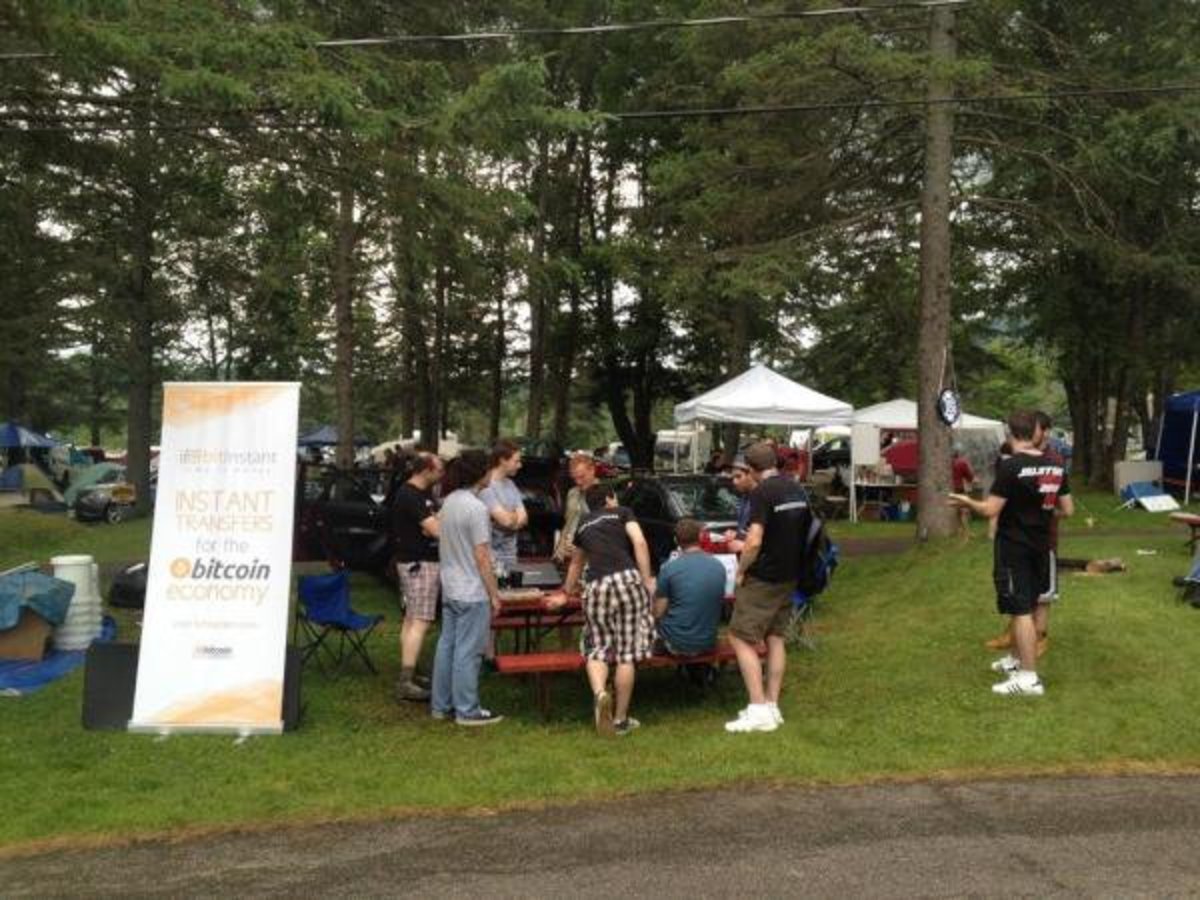
Image credit: Josh Harvey, Porcfest 2012
In 2012, Josh Harvey made a post on the Bitcointalk forum with the following title: “Porcfest 2012: Biggest Bitcoin Event Ever.” Porcfest is one of two annual summits hosted by the Free State Project, a libertarian movement in New Hampshire with over 1,000 active participants, most of whom moved to the state to take part. The event is a week-long gathering on a campsite in northern New Hampshire, and every day is filled with a collection of liberty-themed panel discussions, music and games, and throughout the week there is a marketplace called Agora Valley, where merchants typically accept silver and gold as payment in addition to US dollars (or, as the locals prefer to call them, “federal reserve notes”). In 2012, however, silver and gold were for the first time joined by their new upstart digital companion, with over 80 of merchants accepting Bitcoin as payment. “I talked to some of the ones that didn’t,” Harvey added, “and even they knew exactly what I was talking about. They were interested in doing it, but just hadn’t gotten set up yet.” This year, Bitcoin is expected to take on an even larger role at Porcfest. The Free State Project’s keystone charities, including Antiwar and the medical group Fr33Aid, have started taking Bitcoin donations, and the latter has even converted to being a purely Bitcoin-based organization.
But what is this Free State Project that has let Bitcoin consume it to such a great extent? The underlying objective is simple. In 2001, a number of libertarian activists, disappointed with their failures to get anyone elected inside the United States’ Republican and Democrat-dominated federal government, decided to try a different strategy: find a state that is (i) already very free in both personal and economic matters, and (ii) has a low population, allowing for smaller groups to achieve significant change, and convince 20,000 people to move to that state to actively influence local politics in a libertarian direction. New Hampshire proved to be the perfect candidate; its current population is only 1.3 million, allowing 20,000 movers to have significant control over state politics simply by playing the dominant and evenly matched Republicans and Democrats against each other, and as far as freedom is concerned one must only look as far as the state’s motto: “Live Free or Die”.
The libertarian appeal of New Hampshire can be seen from the moment one drives in; on one highway leading into the state, on the border there is a sign stating that wearing seatbelts is mandatory for those under 18 – that is, unlike every other state, only for those under 18, with the “Live Free or Die” motto written below. The state is quiet and secluded; although the large southern towns like Manchester, Portsmouth and Concord do have bus routes, huge swaths of the state are completely inaccessible by public transportation, making them ideal for those who simply want to live undisturbed and peaceful lives with their families or in small communities far away from the rest of civilization; this sort of idyllic, “down-to-earth”, ideology is especially popular in Graphton, which attracts libertarians with its lack of a building code. For those who enjoy the benefits of civilization, from Manchester Boston is only two hours away by bus. State politics is highly accessible, with 400 representatives in the New Hampshire State House of Representatives (of which about 20 are libertarians) making it easy for anyone to make their voice heard in government. There is no state income and sales tax, although the state makes up the difference via high property taxes – a highly successful partial implementation of a left-libertarian political philosophy known as Georgism.
In my own travels through the state, one common sentiment I have heard is that people here tend to view the local government very favorably; it would be a truly ideal place to live “if only the feds would get out of the way”. And this has a strong ring of truth; from this author’s Canadian point of view, the federal government of the United States, with its bans on drinking alcohol or even entering many bars below age 21, requirements to show identification to board a bus, and constant DHS-funded reminders on TV telling people “if you see something, say something”, feels like a downright police state compared to the “True North Strong and Free”. Incidentally, the high age restriction on alcohol and bars has even led to me personally getting kicked out of a Bitcoin meetup here, although the meetup group was nice (and righteously angry) enough to relocate to a different location. Outside of libertarianism, the other main jarring thing about the United States to a Canadian is the sheer number of advertisements for various private and semi-private health care services.
The Free State Project movement in New Hampshire is essentially centered around two cities: Manchester and Keene. Manchester is important because of its (relatively) large population of 110,000, and by libertarian standards it has its credibility; CNNMoney ranks Manchester as the 13th best city to live and launch a business, and Yahoo ranks it the first in its list of tax-friendly cities. There are no Bitcoin-accepting restaurants yet in Manchester, although Lamassu‘s Josh and Zach Harvey are (at least currently) located in the city and organize a weekly meetup with about seven to ten participants.
Keene is the undisputed “liberty media capital of the world“, with Free Talk Live, LRN.FM (“Liberty Radio Network”) and ten other libertarian shows located there, but is also the home of a much more activist, and controversial, part of the local libertarian movement that focuses heavily on civil disobedience. Marijuana is sometimes involved, and at other times the target is local rules prohibiting filming in courts or distributing pamphlets on school property. A particularly popular (and, in this case, entirely legal) activity is “Robin Hooding”, a deliberate strategy to deprive the Keene government of revenue from parking tickets by following parking inspectors around and filling expired parking meters right before the inspectors come to check any particular spot. Other Free Staters often disagree with the “Keeniacs”‘ actions, seeing them as needlessly provoking the local government even when some of the rules the activists are targeting are downright reasonable. “I think some of the civil disobedience has been constructive and useful—and much of it has not been,” Free State Project founder Jason Sorens has said. If you wish to evaluate the merits of this side of the movement for yourself, consider watching their latest video Derrick J’s Victimless Crime Spree and making your own conclusions.
The one Bitcoin-accepting restaurant currently in New Hampshire is the Pao Cafe in Newmarket, close to Portsmouth. The owner, Matt Corano, is himself part of the Free State Project, and is actively interested in Bitcoin for the ideological reasons. More will soon come; the Free Stater-owned Murphy’s Diner in Manchester may accept it if at least one of its suppliers can be convinced to, and a number of restaurants on Manchester’s Elm Street are potentially interested (although the Harveys are too busy with their Bitcoin ATM to spend too much time promoting Bitcoin adoption locally). But this is not to say that Bitcoin adoption is sparse; in fact, a very large number of people both in the Free State Project and elsewhere accept Bitcoin as payment for various kinds of services. The landlord I personally am staying with during my stay in New Hampshire, Alec Muller, accepts bitcoins for rent at a 20 discount, and Josh and Zach Harvey have managed to get a number of their graphic designers and suppliers to take them.
The other attraction of southern New Hampshire, and Manchester in particular, is its proximity to Boston, a city which has a strong Bitcoin community itself. The main character in Boston is Jay Best, an MIT research affiliate who has put together a weekly Bitcoin meetup group with, just like in Manchester, about seven to ten participants. However, in other ways Best has been more successful. There are now two restaurants accepting Bitcoin, Thelonious Monkfish and Veggie Galaxy.
See a few more pictures of Thelonious Monkfish and Veggie Galaxy here
Thelonious Monkfish appears to be simply an ordinary Asian fusion restaurant, albeit a highly rated one that is fully seated within half an hour of opening its doors at 11:30 on Sunday. Veggie Galaxy is a vegetarian restaurant, featuring veggie burgers, “steaks”, salads, coconut-based cocktails and various kinds of vegan desserts. Both restaurants have plenty of high-quality options on the menu at a reasonable price, although it is possible to get unlucky. More Bitcoin-accepting places are soon to come; first in line are a café and a beer store, and both Best and other Bitcoin users are actively recruiting more. The ideological feel of the Bitcoin community is still largely libertarian, although a significant number are political moderates who like Bitcoin purely for its aspects of reducing transactional friction. The intent of the group is to simply focus on spreading Bitcoin adoption, as well as acting as a hotspot for Bitcoin activity; at the Bitcoin meetup last Friday, two people came to buy bitcoins from Best.
Next week Bitcoin activity in Manchester and Boston will die down somewhat, as all the Bitcoiners will be heading over to Porcfest. The event will be taking place near Lancaster, NH, and tickets will be sold at the door for $75. Accomodations are heavily booked, so if you are not yet prepared to go your best bet may be either renting a room in a hotel 15km away or getting a tent and renting an RV spot. The local hotels and RV spots, unfortunately, do not accept Bitcoin. The first day of the fest will be tomorrow, although the more interesting events will take place later in the week.
See you at Porcfest!









